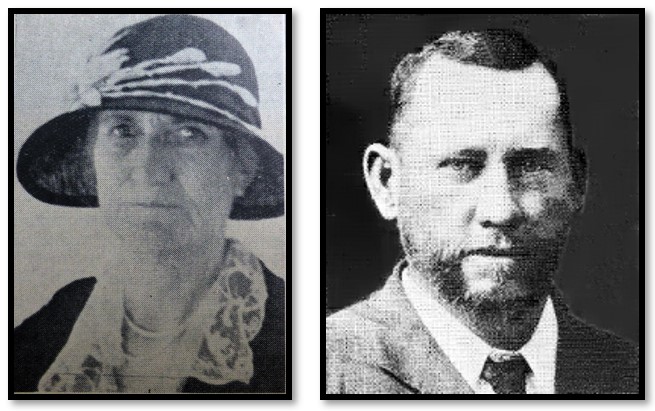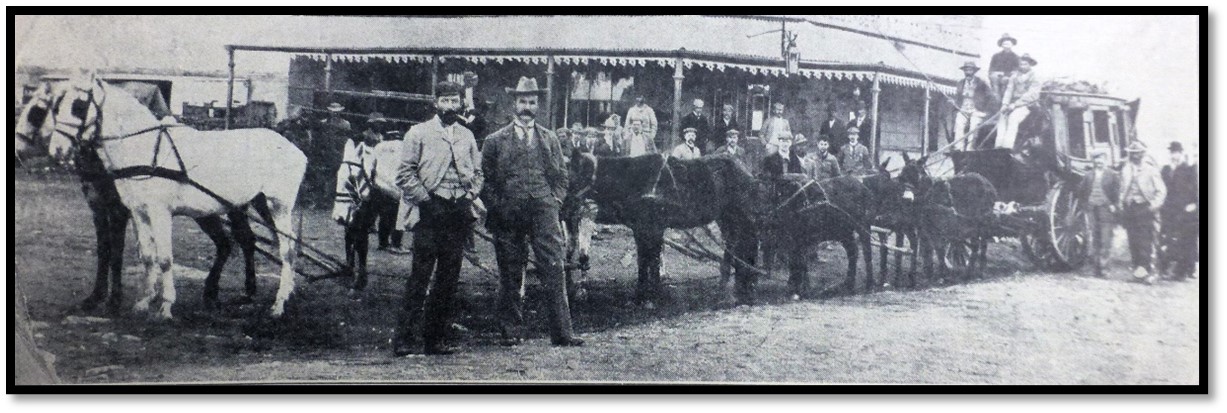By Zeederberg Coach to Bulawayo in 1895
Mrs RA Fletcher of Umvutcha Farm[1] near Bulawayo with two children, one aged 2 years and the other a baby of four months made the journey by coach from Pretoria to Bulawayo via Petersburg (present-day Polokwane) in 1895. An unforgettable experience, she remarked.
We were in the highest spirits as we took our seats very early one morning in one of Zeederberg's[2] coaches, she said, but I was to learn that this form of travelling was far from being the pleasant outing I had imagined it to be. At the start I thought it all so picturesque, the coach with the long team of mules and laden with passengers, mail and luggage. There was only one other woman among the passengers. A man asked me if I was going to Pietersburg and when I answered Bulawayo he looked at the babies, then me and exclaimed, Great Scot. The infant, a small scrap of humanity, was lying across my knees on a pillow and the little one had to endure being bumped through kloof and stream, through storms, and swollen rivers before we reached our journey's end - Bulawayo.

One of only two Abbot Downing Company ‘Concord’ Coaches remaining in Southern Africa at the Natural History Museum of Bulawayo
I shall not take you all over that journey by coach. Imagine sitting bolt upright for nearly a week day and night with a child in your arms and another beside you. The baby was seldom out of my arms during the journey. One kind man helped me with the other child. I was so helpless attending to the baby in the dark. Actually, we had more rest in daytime than at night for night travelling being more dangerous, we often had to get out and walk.
Mrs Fletcher drew a vivid picture of one night when, in a storm, the coach had to negotiate a road that had been badly washed out. The passengers stumbled along through boulders and bush, keeping the coach in sight only when lightning flashed. Boulders, bush and darkness - these are my memories of that night, as with the baby in my arms, I stumbled along until at last the coach stopped to pick us up.

Mrs R.A. Fletcher Doel Zeederberg
The dawn was always welcome, she said, for it marked another step onward. After leaving Pietersburg I was told that I would always be able to get fresh milk, but to my sorrow I found that was untrue and I had to share my little stock of condensed milk between the children. The moment the coach drew up, we all crept out to stretch our cramped limbs. The men stamped vigorously around, but I was always too tired to do more than look for the nearest shade in which to lay my little sons down. All too soon I heard the driver call All aboard! That journey seemed to last a lifetime. In time we reached the Limpopo and the drift was certainly very picturesque that night with campfires. But there was one sad sight and that was the coop of dank, dead fowls, which came to light when a wagon had been pulled out of the drift. We crossed (the coach also) in the pontoon above the drift and soon left the Limpopo behind us.

The Zeederberg coach ready to leave
In the middle of the night the coach was stuck in a bog. Rain was falling and soon the driver came to the window of the coach ordering the passengers to climb out. Mrs Fletcher wrapped her baby in a blanket and got out in the rain. Afterwards she lay down alongside a fire which natives were endeavouring to keep alive. She was soon fast asleep in the rain. After a time the coach was extricated and seated once more, Mrs Fletcher got the children into dry clothes.
At Tuli the police reported the Shashe is up, but the driver decided to risk the crossing. We waved goodbye to the police with thanks for their kindness to us, said Mrs Fletcher, and then plunged into the stream. Steadily and slowly the coach went, keeping a course upstream. Soon we began to be nervous, for water was coming into the coach ever faster, and after a time, the coach stopped altogether. The water was swirling round it. With our heads out of the window, and a deadly fear in our hearts, we saw a commotion on the riverbank and presently we saw a boat being launched and coming out to us. The driver clambered down and came round to the window to tell us the river was still rising, that we could go no further, and that a boat was coming for us. He also told us that the coach will be pulled back and we would get a fresh coach and mules on the other side. It was rather an awkward business scrambling out of the coach window into the boat. The boat was so unsteady that I was afraid the babies would fall into the water. However, we reached the other side safely. The boat stuck in the sand some distance from the side and we were then carried pick-a-back by a native who staggered along through the water with his human burdens and calmly dumped us face first into the sand.
The boat returned two or three times to fetch the mails and luggage and we were left to trudge through the sand till we reach the stable, miles away it seemed to me. However, we reached the coach and were soon galloping on our way.
These are the most vivid memories of my coach journey back in 1895. After Tuli the only white people we saw were occasional traders and their hearts melted when they saw the babies. Many of them insisted on being allowed to handle the little ones.

Wikipedia – the Zeederberg Coach about to depart from Bulawayo
References
Occupation of Matabeleland: A Souvenir
[1] See the article A Visit to Lobengula at the King’s Kraal or Umvutcha in 1889 – Lieut-Col. H. Vaughn-Williams recalls his stay after 57 years under Bulawayo on the website www.zimfieldguide.com
[2] For more detailed information see the article The Zeederberg Coach Company and the first passenger services into the country under Bulawayo on the website www.zimfieldguide.com
